译林版高中英语选修七单元测试题及答案全套
高二英语译林版选修7单元检测:Unit1Livingwithtechnology含解析
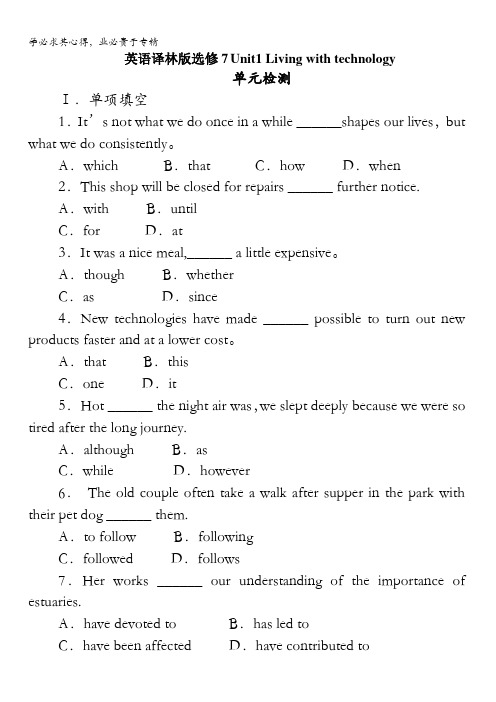
英语译林版选修7Unit1 Living with technology单元检测Ⅰ.单项填空1.It’s not what we do once in a while ______shapes our lives,but what we do consistently。
A.which B.that C.how D.when2.This shop will be closed for repairs ______ further notice.A.with B.untilC.for D.at3.It was a nice meal,______ a little expensive。
A.though B.whetherC.as D.since4.New technologies have made ______ possible to turn out new products faster and at a lower cost。
A.that B.thisC.one D.it5.Hot ______ the night air was,we slept deeply because we were so tired after the long journey.A.although B.asC.while D.however6.The old couple often take a walk after supper in the park with their pet dog ______ them.A.to follow B.followingC.followed D.follows7.Her works ______ our understanding of the importance of estuaries.A.have devoted to B.has led toC.have been affected D.have contributed to8.John was late for the business meeting because his flight had been ______ by a heavy storm.A.kept B.stoppedC.slowed D.delayed9.Don't all speak at once!______,please.A.Each at one timeB.One by one timeC.One for each timeD.One at a time10.The incomes of skilled workers went up。
2019-2020学年高中英语(湖南专用)译林版选修7习题:第一单元测评 Word版含解析
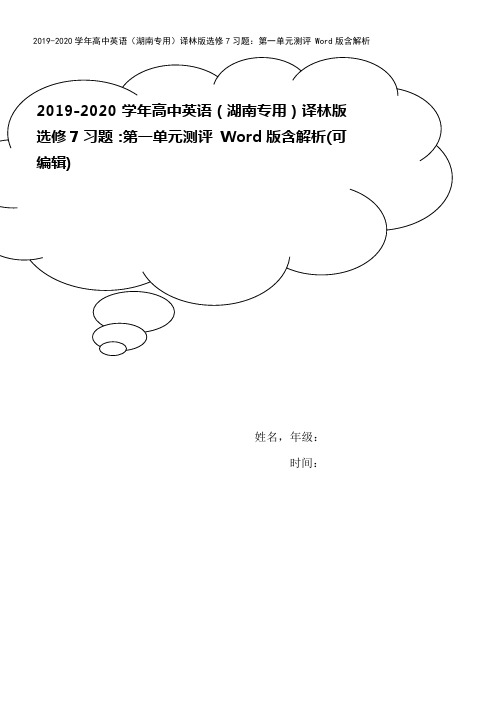
姓名,年级:时间:第一单元测评(时间:120分钟总分:150分)第Ⅰ卷第一部分听力(共两节,满分30分)第一节(共5小题;每小题1.5分,满分7。
5分)听下面5段对话。
每段对话后有一个小题,从每题所给的A、B、C三个选项中选出最佳选项,并标在试卷的相应位置.听完每段对话后,你都有10秒钟的时间来回答有关小题和阅读下一小题。
每段对话仅读一遍。
W:Excuse me,could you tell me the way to the nearest hospital?M:Well,take the first turning on the left,and there is a bus stop。
Bus No.18 will take you there.Or you can walk there。
It's only 15 minutes’ walk。
W:There's only ten minutes to go。
A taxi is my only choice。
1.How will the woman go to the hospital?A。
By taxi。
B.On foot. C。
By bus.答案:AM:Can I help you?W:Yes,doctor.This is my son.He’s only three years old。
M:What happened to him?W:He drank some ink ten minutes ago.2。
What’s the matter with the woman's son?A。
He drank too much.B.He drank some ink。
3。
Where did the conversation probably take place? A。
In a hotel. B.At home。
C。
In the street.4.Why was the man late for school this morning?A.He got up late.B.He had to return home for some books.C.He was caught in a traffic jam。
高二英语译林版选修7单元测试:Unit2 Fitforlife 含解

单元测评第Ⅰ卷(三部分,共115分)第一部分听力(共两节,满分30分)第一节(共5小题;每小题1.5分,满分7.5分)听下面5段对话。
每段对话后有一个小题,从题中所给的A、B、C三个选项中选出最佳选项,并标在试卷的相应位置。
听完每段对话后,你都有10秒钟的时间来回答有关小题和阅读下一小题。
每段对话仅读一遍。
1.When will the washing machine probably arrive?A.Today.B.Yesterday.C.Three days later.2.What is the most probable relationship between the two speakers?A.Friends.B.Relatives.C.Strangers.3.Where does the women think Mr. Clarke is now?A.In his office.B.In the cinema.C.On his way home.4.Why does the man make the telephone call?A.To book a double room for two.B.To make sure about the reservation.C.To say hello to the manager.5.What is the man?A.A salesman.B.A teacher.C.A worker.第二节(共15小题;每小题1.5分,满分22.5分)听下面5段对话或独白。
每段对话或独白后有几个小题,从题中所给的A、B、C三个选项中选出最佳选项,并标在试卷的相应位置。
听每段对话或独白前,你将有时间阅读各个小题,每小题5秒钟;听完后,各小题将给出5秒钟的作答时间。
每段对话或独白读两遍。
听第6段对话,回答第6~8题。
6.Where does the man want to go?A.London.B.Ireland.C.Edinburgh.7.How much is it for a return ticket?A.£46.5B.£23.C.£40.8.What time is it at that moment?A.2:00.B.1:30.C.2:30.听第7段对话,回答第9~11题。
牛津译林版高中英语选修七M7U3单元测试卷(三)
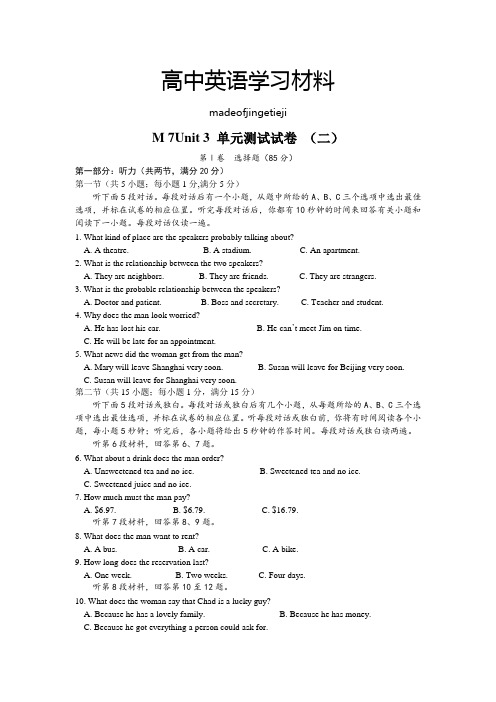
高中英语学习材料madeofjingetiejiM 7Unit 3 单元测试试卷(二)第Ⅰ卷选择题(85分)第一部分:听力(共两节,满分20分)第一节(共5小题;每小题1分,满分5分)听下面5段对话。
每段对话后有一个小题,从题中所给的A、B、C三个选项中选出最佳选项,并标在试卷的相应位置。
听完每段对话后,你都有10秒钟的时间来回答有关小题和阅读下一小题。
每段对话仅读一遍。
1. What kind of place are the speakers probably talking about?A. A theatre.B. A stadium.C. An apartment.2. What is the relationship between the two speakers?A. They are neighbors.B. They are friends.C. They are strangers.3. What is the probable relationship between the speakers?A. Doctor and patient.B. Boss and secretary.C. Teacher and student.4. Why does the man look worried?A. He has lost his car.B. He can’t meet Jim on time.C. He will be late for an appointment.5. What news did the woman get from the man?A. Mary will leave Shanghai very soon.B. Susan will leave for Beijing very soon.C. Susan will leave for Shanghai very soon.第二节(共15小题;每小题1分,满分15分)听下面5段对话或独白。
牛津译林版高中英语选修七《Unit1Livingwithtechnology》SectionCGrammarandusage(含答案解析)

Section C Grammar and usageⅠ.单项填空1. (2012·北京高二检测) New ideas and values took the place of those _______ in the Middle Age.A. heldB. having heldC. being heldD. holding2. Unfortunately, the government has shown that it will _______ the plans to build thousands of homes for people in the South Hams.A. objectB. agreeC. object toD. agree to3. (2012·白银高二检测) _______ poor at English, I’m afraid I can’t make myself _______.A. To be; understandB. I’m; to understandC. Being; understandingD. Being; understood4. This kind of glasses manufactured by experienced craftsmen _______ comfortably.A. is wornB. wearsC. wearingD. are worn5. (2012·鹤岗高二检测) Wherever you go, you can see the products _______.A. advertiseB. advertisedC. to be advertisedD. being advertised6. We were lucky that we just escaped _______ the rain.A. being caught inB. to be caught inC. catchingD. to catch7. In the reading room, we found her seated at a desk, her attention _______ on a novel.A. fixingB. to fixC. fixedD. having fixed8. Before the sales start, I make a list of _______ my kids will need for the coming season.A. whyB. whatC. howD. which9. —I don’t suppose the police know who did it. —Well, surprisingly they do. A man has been arrested and _______ now.A. has been questionedB. is being questionedC. is questioningD. has questioned10. I can’t stand _______ with Jane in the same office.She just refuses _______ talking while she works.A. working; stoppingB. to work; stoppingC. working; to stopD. to work; to stop11. (2012·蚌埠高二检测)I really appreciate _______to relax with you on this nice island.A. to have had timeB. having timeC. to have timeD. to having time12. Every Monday morning, students in our schoolwould stand at attention, watching the national flag _______.A. raisingB. risingC. being risenD. being raised13. (2012·南京高二检测)—Have we _______ petrol?—Yes, _______. We’d better get some around here.A. run out of; we have run it outB. run out of; our petrol has run outC. run out of; our petrol has been run outD. run out; our petrol has run out14. I am considering _______ a car. Which brand isconsidered _______ the best?A. buying; beingB. buying; to beC. to buy; beingD. to buy; to be15. —Did the thief admit the fact?—No, he denied _______ a book from the bookshop.A. stealingB. to stealC. to have stolenD. stolen16. (2011·浙江高考) Even the best writerssometimes find themselves _______ for words.A. loseB. lostC. to loseD. having lost17. (2011·湖南高考) In the near future, moreadvantages in the robot technology _______ by scientists.A. are makingB. are madeC. will makeD. will be made18. (2012·湖南高考) We’ve had a good start, butnext, more work needs _______ to achieve the final success.A. being doneB. doC. to be doneD. to do19. (2012·安徽高考) I remembered _______ thedoor before I left the office, but forgot to turn off the lights.A. lockingB. to lockC. having lockedD. to have locked20. (2010·重庆高考) The palace caught fire threetimes in the last century, and little of the originalbuilding _______ now.A. remainsB. is remainedC. is remainingD. has been remained Ⅱ.用所给词的适当形式填空1. We saw the mountain when the clouds ____________ (lift).2. When the stone ____________(lift), they found a gold ring under it.3. We have many buyers ____________(wait) for available units here.4. The shop had many things ____________(steal) last night.5. She ____________(begin) working as a librarian after she left school.6. The work ____________(begin) at eight will be finished soon.7. She ____________(speak) at the meeting yesterday evening.8. English ____________(speak) in more and more countries.9. The machine wasn’t ____________(operate) right so that it broke down.10. The doctor is ____________(operate) on a patient now. Ⅲ.完成句子1.我们的孩子们被教育要全心全意为人民服务。
2017-2018学年高中英语(江苏牛津译林版选修七)Unit2单元综合测评含答案
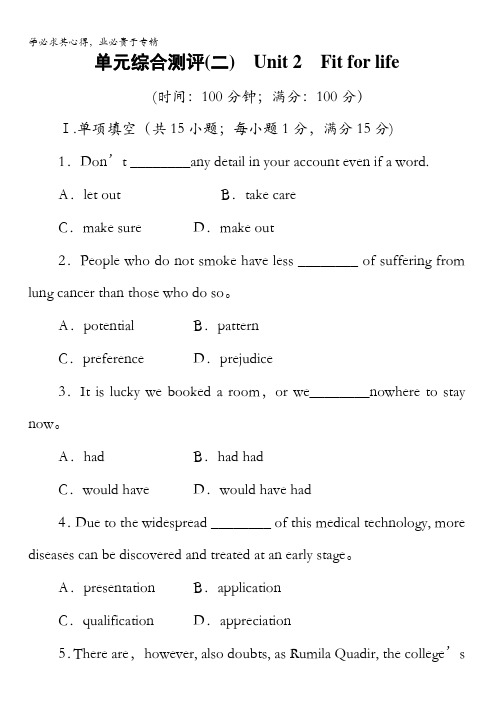
单元综合测评(二)Unit 2Fit for life(时间:100分钟;满分:100分)Ⅰ.单项填空(共15小题;每小题1分,满分15分)1.Don’t ________any detail in your account even if a word.A.let out B.take careC.make sure D.make out2.People who do not smoke have less ________ of suffering from lung cancer than those who do so。
A.potential B.patternC.preference D.prejudice3.It is lucky we booked a room,or we________nowhere to stay now。
A.had B.had hadC.would have D.would have had4.Due to the widespread ________ of this medical technology, more diseases can be discovered and treated at an early stage。
A.presentation B.applicationC.qualification D.appreciation5.There are,however, also doubts, as Rumila Quadir, the college’s18。
year。
old student union president puts it,“the intentions behind the scheme are good,but I don’t see how it will ________ young people.”A.subscribe to B.appeal toC.tend to D.submit to6.Many car accidents happened at this ________turn of the road。
译林牛津版选修7检测题:Unit1英语卷(带答案与解析)解答解析、考点详解.doc

译林牛津版选修7检测题:Unit1英语卷(带答案与解析)的正确答案、解答解析、考点详解姓名:_____________ 年级:____________ 学号:______________1.【题文】—Well, Dick, I ’m sorry but I have to leave. —_______. I hope to hear from you soon.A .Enjoy yourselfB .Keep in touchC .Don ’t be so sadD .So am I【答案】B【解析】 B 本题考查情景交际。
句意:“噢,迪克,很抱歉我要走了。
”“保持联系。
我希望不久就收到你的来信。
”A 项意为“玩得高兴”;B 项意为“保持联系”;C 项意为”不要难过”;D 项意为“我也是这样”。
由句意可知选B 项。
2.【题文】The woman she acted in the film is _______ the women in the 1930s.A .typical ofB .conventional ofC .impressive ofD .consistent of【答案】A【解析】A 本题考查形容词辨析。
句意:她在电影中扮演的那个妇女是20世纪30年代妇女的典型代表。
typical of………的典型代表;conventional 惯例的;impressive 印象深刻的;consistent 一致的。
3.【题文】(2012·昆明高二检测)It is well-known that proper amounts of exercises, if _______ regularly, will benefit our health.A .being carried outB .carrying outC .carried outD .to carry out【答案】C【解析】C 句意:据说如果有规律地进行适量的运动,对健康有益。
牛津译林版高二英语选修七Unit 3单元基础练习题及答案
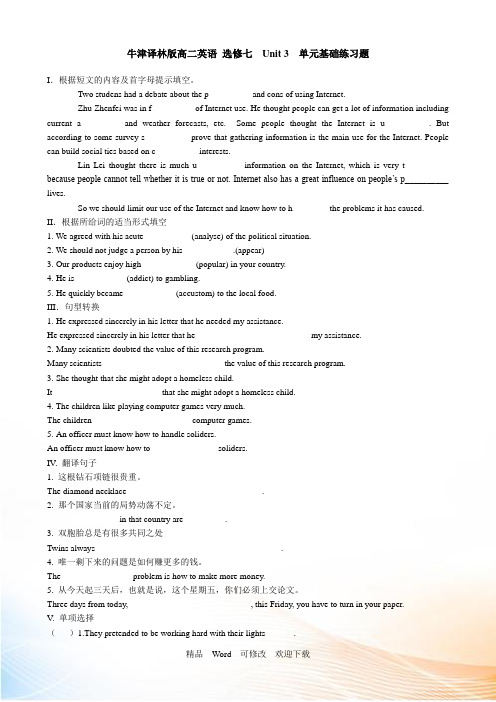
牛津译林版高二英语选修七Unit 3 单元基础练习题I.根据短文的内容及首字母提示填空。
Two studens had a debate about the p__________and cons of using Internet.Zhu Zhenfei was in f__________of Internet use. He thought people can get a lot of information including current a__________and weather forecasts, etc. Some people thought the Internet is u__________. But according to some survey s__________ prove that gathering information is the main use for the Internet. People can build social ties based on c__________interests.Lin Lei thought there is much u__________ information on the Internet, which is very t__________ because people cannot tell whether it is true or not. Internet also has a great influence on people’s p__________ lives.So we should limit our use of the Internet and know how to h________ the problems it has caused. II.根据所给词的适当形式填空1. We agreed with his acute __________ (analyse) of the political situation.2. We should not judge a person by his ___________.(appear)3. Our products enjoy high ____________(popular) in your country.4. He is ___________ (addict) to gambling.5. He quickly became ___________ (accustom) to the local food.III.句型转换1. He expressed sincerely in his letter that he needed my assistance.He expressed sincerely in his letter that he ______ ______ ______ ______ my assistance.2. Many scientists doubted the value of this research program.Many scientists ______ ___________ _________ the value of this research program.3. She thought that she might adopt a homeless child.It ________ _______ ________ that she might adopt a homeless child.4. The children like playing computer games very much.The children _______ _______ _______ computer games.5. An officer must know how to handle soliders.An officer must know how to _______ _______ soliders.IV. 翻译句子1. 这根钻石项链很贵重。
- 1、下载文档前请自行甄别文档内容的完整性,平台不提供额外的编辑、内容补充、找答案等附加服务。
- 2、"仅部分预览"的文档,不可在线预览部分如存在完整性等问题,可反馈申请退款(可完整预览的文档不适用该条件!)。
- 3、如文档侵犯您的权益,请联系客服反馈,我们会尽快为您处理(人工客服工作时间:9:00-18:30)。
译林版高中英语选修七单元测试题及答案全套Unit 1单元质量检测(一)(时间:100分钟满分:100分)Ⅰ.单项填空(满分15分)1.You must return the book to me today. There will be no excuse for any further ________.A.response B.hesitationC.delay D.loss2.People in the village voted ________ the college graduate to be their leader, for they thought he could help their village become better.A.against B.onC.for D.to3.There is no doubt that Syrian people have the wisdom to find a development path ________ for their national conditions.A.considerate B.disturbingC.suitable D.fortunate4.Not until he went through real hardship ________ the love we have for our families is important.A.had he realized B.did he realizeC.he realized D.he had realized5.________ to ________ the nature reserve, the local people prevented the construction workers from entering their villages.A.Opposing; developing B.Opposed; developingC.Opposing; develop D.Opposed; develop6.________ hard you try, it is difficult to lose weight without cutting down the amount you eat.A.However B.WhateverC.Whichever D.Whenever7.Jenny hopes that Mr Smith will suggest a good way to have her written English ________ in a short period.A.improved B.improvingC.to improve D.improve8.—Shall we go for a drink at one o'clock this afternoon?—________.Will two o'clock be OK?A.Sure, it's up to youB.Sure, no problemC.Sorry, I can't make itD.Sorry, I'm not available today9.Believe it or not, we keep in touch ________ writing letters instead of sending e-mails.A.with B.ofC.on D.by10.—There is no doubt that I can work out the difficult problem in five minutes.—________. Try it before you come to such a conclusion.A.Easier said than done B.Early sow, early mowC.Well begun is half done D.No pains, no gains11.In the distance, ________ a little girl with her lovely dog following her closely.A.walking in the rain wasB.was walking in the rainC.in the rain was walkingD.was in the rain walking12.I had just stepped out of the bathroom and was busily drying myself with a towel ________ I heard the steps.A.while B.whenC.since D.after13.Before I ________,there are two more things to be said.A.turn up B.come upC.wind up D.hold up14.The spokesman said that Japan should, ________ ignore its aggressive past, reflect on its own history and its current policies.A.more than B.other thanC.better than D.rather than15.When ________ for his views about his teaching job, Philip said he found it very interesting and rewarding.A.asking B.askedC.having asked D.to be askedⅡ.完形填空(满分20分)Now that the Spring Festival is over, I only have school to look forward to. It's __16__ funny.I find myself looking forward more and more to school.As usual, __17__ can get little work __18__ during the winter vacation. For one thing, the Spring Festival is always a big distraction (使人快乐之事), and for days before and after __19__ can get any work done. It's all right if you really have a nice time, as I used to. But now I find myself __20__ it less and less.I __21__ enjoying fireworks and firecrackers years ago. The firecrackers especially get on my nerve. I really think we should stop making them, as every year many children have their eyes hurt or even __22__. Even worse, sometimes fires __23__ out and whole buildings get __24__ down.Still I suppose we'll continue to make them __25__ there is a market for them.And the __26__!People spend days buying. The result too much and too rich which does nobody any good: chicken, duck, fish, meat and so on. What's __27__,they become __28__,too. Too much of a good thing, as we say, and this visiting business too. It's all right for a few really good friends __29__ together and chat over some tea or drinks. But mere acquaintance and the usually not too neighborly neighbors dropping __30__ to say hello, —well, I suppose these are wellintended gestures, but I find them a pain in the neck (讨厌的家伙). Usually there is nothing to talk about __31__ some meaningless words.Oh yes, I __32__ myself skating on the nearby lake __33__ a few times. The ice is not too good now and getting very __34__. I stopped going before the Spring Festival. But there are people who are __35__ too reckless (不计后果的) or too ignorant or both, and we hear about people falling through thin ice every year.16.A.a little B.notC.really D.little17.A.I B.youC.he D.she18.A.performing B.finishedC.doing D.done19.A.anyone B.someC.nobody D.somebody20.A.enjoying B.dislikingC.enjoyed D.experiencing21.A.started B.likesC.stopped D.went on22.A.blind B.blindedC.blindness D.blinding23.A.set B.breakC.start D.take place24.A.burned B.burningC.built up D.lied25.A.as long as B.as soon asC.once D.so26.A.business B.amusementC.toy D.food27.A.less B.the moreC.more D.much28.A.taste B.tastelessC.tasty D.tasted29.A.to get B.comingC.to talk D.to speak30.A.in B.onC.of D.for31.A.besides B.except thatC.but D.except for32.A.do like B.did enjoyC.do enjoy D.did like33.A.much B.wellC.very D.quite34.A.thin B.thickC.thinner D.small35.A.nor B.orC.neither D.eitherⅢ.阅读理解(满分30分)ALeading experts on the Internet, technology and policy have shared the same opinion on what we can expect in the next decade when it comes to connectivity and its effects on society.The Pew Research Center report asked thousands of experts and members of the public for opinions on “the most significant overall influence s of our uses of the Internet on humanity” — and some had a rosier outlook than others.“The smartest person in the world nowadays could well be stuck behind a plough in India or China,”said Hal, Google's chief economist.“Enabling that person —and the millions like him or her — will have a strong effect on the development of the human race.”Early Internet pioneer David Hughes agreed: “When every person on this planet can communicate two-way with every other person on this planet, the power of nation states to control every human inside its geographic boundaries may start to disappear.”Wearables (electronic equipment that people can wear) could monitor more than just steps, predicted UC Berkeley's Aron Roberts —or do more than just monitor: “We may literally be able to adjust both medications and lifestyle changes on a day-by-day basis or even an hour-by-hour basis.”Microsoft Research's Jonathan Grudin is more pessimistic (悲观的): “By making so much activity visible, it exposes the gap between the way people behave and the way we think they ought to behave.Adjusting to this will be an unending, difficult task.”And the difference between the rich and the poor will have a new aspect: “Only the well-off (and well-educated) will know how to preserve their privacy,”warned one expert.“Will the Internet make it possible for our entire civilization to fall down together, in one big awful step? Possibly,”admitted Harvard's Doctor Searles.“But the Internet has already made it possible for us to use one of our unique advantages — the ability to share knowledge — to a degree higher than ever before.”36.According to Hal, in the future, those who will influence the development of human race are________.A.Google's economists B.Chinese and IndiansC.the educated persons D.world leading experts37.People will be able to change their lifestyles at any time according to________.A.the development of communication skillsB.the suggestions made by computer expertsC.the prediction made by the home computersD.the data recorded by the computers worn on body38.The underlined word “this”in Paragraph 6 refers to________.A.the visible activities mentioned aboveB.the way we thought they ought to behaveC.the way people really behave in lifeD.the rule people ought to obey in life39.Which of the following can best express the meaning of the last paragraph?A.Advantages and disadvantages of the Internet.B.Development of the Internet and human beings.C.Knowledge and civilization of human beings.D.Possibilities of the Internet for the future users.BIt's been said that life turns on small things. Sometimes it's hard to see how small choices can change your life. But when put together over time, the little things can make the biggest difference.The theme of SuccessforTeens is “Little Things Matter.”The book helps teens identify small, positive choices they can make in their lives to help them reach their goals. Lots of teens don't realize how the little choices in their lives can have lasting effects. Often they are focused on the bigger events, such as a major exam, the big game or competition, or choosing a college. The little things, however, can go unnoticed unless your teen understands how important they can be.The little things that lead to success are mostly easy to do. Help your teen identify a few areas in everyday life where he or she can make small, positive choices. It might be as simple as getting up on time, prioritizing (按重要性排列) their schoolwork, putting in an extra 10 minutes of practice or using some spare time to help someone else.Nineteenyearold Kyle Freas used to be on his school baseball team and would play every day after school. When the season was over, he had an empty three hours a day, so he started spending one third of such extra time daily, looking for ways to help other kids. Over the last few years, his project has raised thousands of dollars to help abused, homeless and sick children. Kyle spent just a little time each day doing something that ended up benefiting a lot of kids. The important thing to understand is that Kyle made the small and positive decisions necessary for success.Make sure your child understands that even though the results of the positive choices may not be seen right away, they are building on each other and taking him or her on a path that will lead to success.40.We learn from Paragraph 2 that ________.A.dealing with big events is most important in one's lifeB.little choices seldom have lasting effects on one's lifeC.teens should try to focus their attention on big choicesD.many teens fail to realize the importance of little choices41.Which of the following words can be used to describe Kyle Freas?A.Kindhearted. B.Creative.C.Naughty. D.Selfconfident.42.The author mainly discusses the relationship between ________.A.little choices and big choicesB.teens' goals and their actionsC.positive and negative decisionsD.small positive choices and success43.The text is most probably written for ________.A.teenagers B.parentsC.pupils D.teachersCWant to improve your math skills without working hard? Simply zap (击打) the brain with a weak current of electricity and then, all your problems will be solved! At least that's the claim being made by a team of British scientists from London's Oxford University.The main aim of the experiment, conducted on a group of student volunteers from Oxford University and University College London, was to test if parts of the brain could be shocked into getting it to work better with numbers.To test this, 15 students, divided into three groups, were asked to solve the same two mathematical problems every day for a week. The problems, which involved identifying the larger of two numbers and plotting one on a number line, were made a little more challenging by replacing the numbers 1-9 with symbols.However, before starting the test, two of the groups were subjected to a 20minute session of a light electric current to the parietal lobe, which the scientists believe is the brain's number cruncher (能迅速运算者). For the first group the current flow was passed right to left, while for the second it was transmitted left to right. The third group received no help at all.The group that got zapped right to left seemed to show an amazing improvement in their math skills. However, the ones that got zapped left to right were reduced to the level of almost sixyear olds! The results forthe people who got no help were somewhere in between.While scientists are not sure why the direction of the current would make such a difference, they believe that zapping it from the right side, seemed to turn up the activity of the brain cells to math, while going the other way turned or closed them down. Luckily, the impact is expected to last for only six months!While this is great news, do not fire your math tutor yet. That's because the research, no matter how successful, is not being done to aid lazy students, but to help people who suffer from dyscalculia (计算障碍), a disease which makes people unable to cope with simple day-to-day numerical issues, like counting change or figuring out their expenses.44.In which time order was the experiment carried out?a.Divide the students into groups.b.Test the students with problems.c.Give some students some electric zapping.A.a,b,c B.a,c,bC.b,a,c D.c,a,b45.From the passage, we can infer that ________.A.the direction of zapping the brain is very importantB.the impact of zapping the brain will last foreverC.scientists don't know how to zap the brain correctlyD.people with dyscalculia can't recognize numbers46.What is the aim of the experiment?A.To help students to improve their math grades.B.To test which part of the brain controls calculation.C.To help people who suffer from a certain disability.D.To study whether a light electric current will damage students' brain.47.What would be the best title for the passage?A.Dyscalculia is no longer a problemB.A good way to improve your math skillsC.Benefit from zapping the brainD.Improve math skills by zapping the brainDSome researchers believe that the mobile phone makes youngsters less thoughtful and makes it easier for them to make mistakes in life. Hitting a few keys and then seeing the desired word appear in full trains children to be fast but inaccurate when they do other things, according to scientists. They warn that this could have a negative impact on a whole generation.ChildWise, a market research firm specializing in children's products, found that one in four undereights had a mobile. The total of 4.5 million youngsters with mobiles included 58 percent of 9 to 10yearolds, 89 percent of 11 to 12yearolds, 93 percent of 13 to 14yearolds and 95 percent of 15 to 16-year-olds.Experts are also concerned about the possible impact of mobile phone radiation on developing brains. But Michael Abramson, a professor at Monash University, Melbourne, Australia, says the amount of radiation transmitted during text messaging is a mere 0.03 percent of that transmitted during voice calls —suggesting radiation is not to blame for the brain effects.In a recent study, Prof Abramson analyzed the mobile phone use of children aged between 11 and 14 and their ability to carry out a number of computer tests. He found that increased mobile phone use appears to change the way their brains work. He said, “The kids who used their phones a lot were faster on some of the tests, but were less accurate. We suppose that using mobile phones a lot, particularly tools like predictive texts for SMS, is training them to be fast but inaccurate. The use of mobile phones is changing the way children learn and pushing them to become more impulsive in the way they behave without thinking things through.”The findings follow other research that suggested that text messaging encourages children's language skills and does not damage the ability to spell.48.It can be concluded from the ChildWise's research that ________.A.the older the child is, the greater chance he has a mobile phoneB.children under eight are too young to use mobile phonesC.children aged between 11-14 were not involved in the researchD.4.5 million people have a mobile phone in Australia49.Which of the following statements is TRUE according to the passage?A.Prof Abramson thinks mobile phones have little effect on children.B.There's less radiation transmitted during text messaging than during voice calls.C.Text messaging trains children to be fast and accurate.D.Text messaging may damage children's ability to spell.50.What does the underlined word “impulsive”in the fourth paragraph mean?A.Encouraging someone to do something.B.Forcing someone to accept a way of life.C.Doing things without considering the effects they may have.D.Doing things with careful planning and consideration.Ⅳ.任务型阅读(满分10分)Good communication is vital in modern society. We know that much of the communication is unspoken. Consciously or unconsciously, we show our true feelings with our eyes, faces, bodies and attitudes. Your good qualities can make good communication. The personal qualities include:physical appearance, energy, rate of speech, pitch and tone of voice, gestures, expressiveness of eyes, and the ability to hold the interest of others.What should we do so that our communication will be effective?Here are my suggestions.Firstly, you should be yourself. The trick is to be consistently you, at your best. The most effective people never change character from one situation to another. They're the same whether they're having a conversation with their close friends, addressing their garden club or being interviewed for a job. They communicate with their whole being.Secondly, whether you're talking to one person or one hundred, always remember to look at them. Don't break eye contact while talking. As you enter a room, move your eyes comfortably, then look directly at those in the room and smile. This shows clearly that you are at ease. Smiling is important. The best type of smile and eye contact is gentle and comfortable, not forced.You should also absorb other people before showing yourself. You can't learn anything when you talk. When you attend a meeting, a party or an interview, don't immediately start throwing your opinions.Stop for a second.Absorb what's going on.What's the mood of the others?Are they down, up, happy, expectant? Are they eager to learn from you, or do they show resistance? If you can sense what's happening with others, you will be better able to reach them. So, listen before you talk.The fourth suggestion is that you focus your energy. How do you get your energy up? Before the meeting, collect your thoughts about the goal of the meeting —yours and the others'. Once you go through the doorway, no longer think about yourself. Focus on the person you are meeting to find out what he is interested in. Properly collected energy comes across when we sincerely believe something. When you speak with energy, you are involved with your audience and your message. You create an air of certainty.The audience may disagree with you, but they can't question your belief.Lastly, I would like to remind you that you should lighten up. Take a good hard look at yourself.Do you say “I” too often? Are you only concent rated on your own problems? Do you complain frequently? If you answered yes to even one of these questions, you need to be more relaxed.阅读下面的短文,然后按照要求写一篇150词左右的英语短文。
